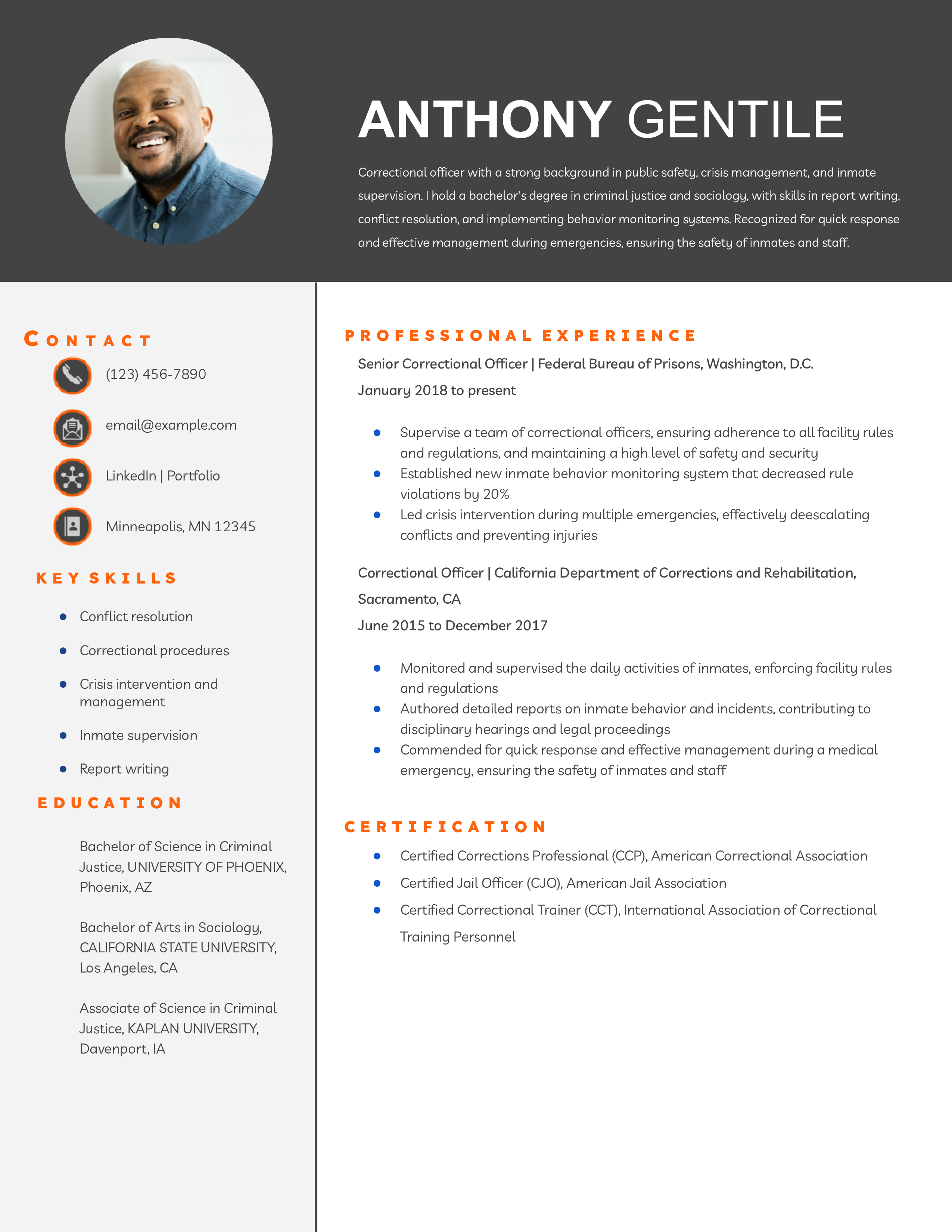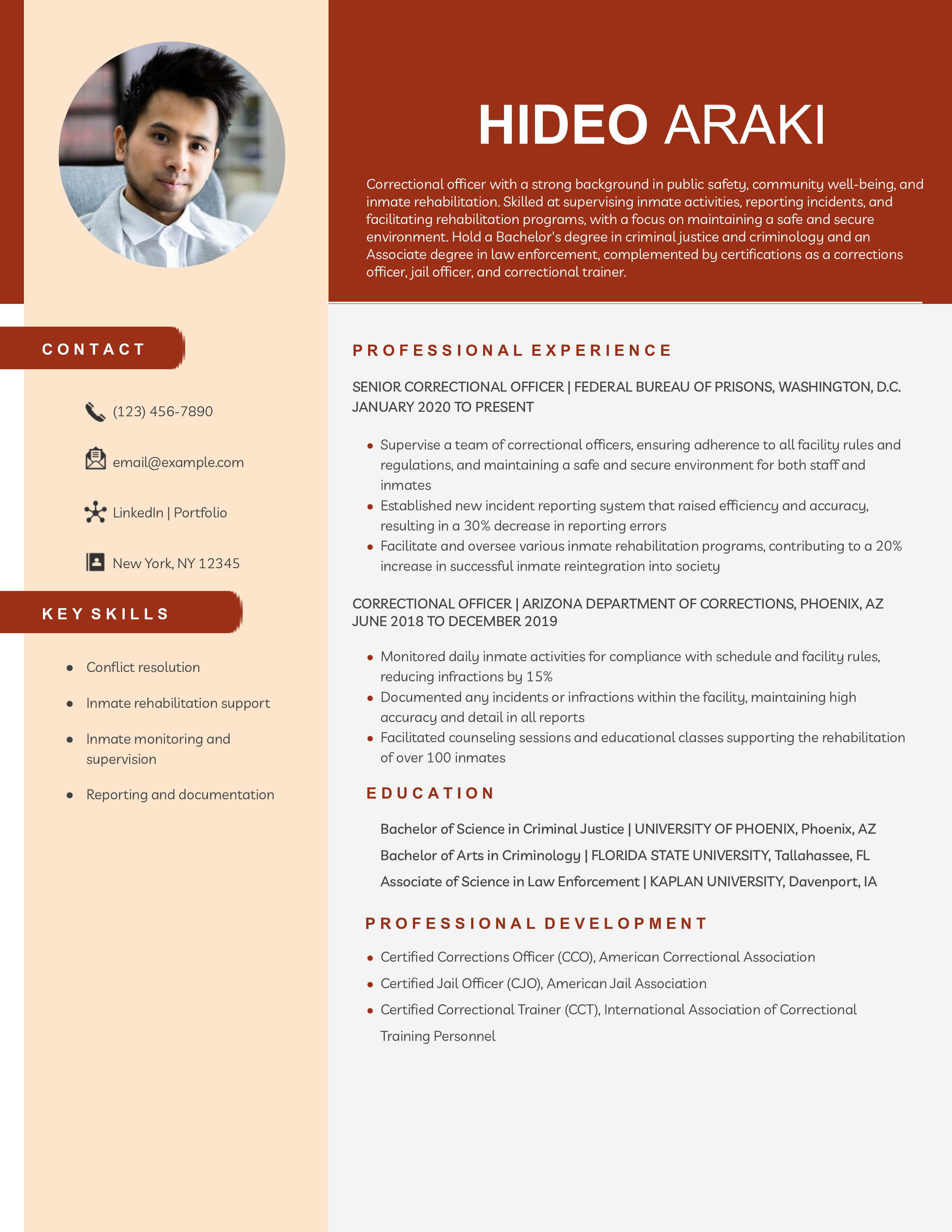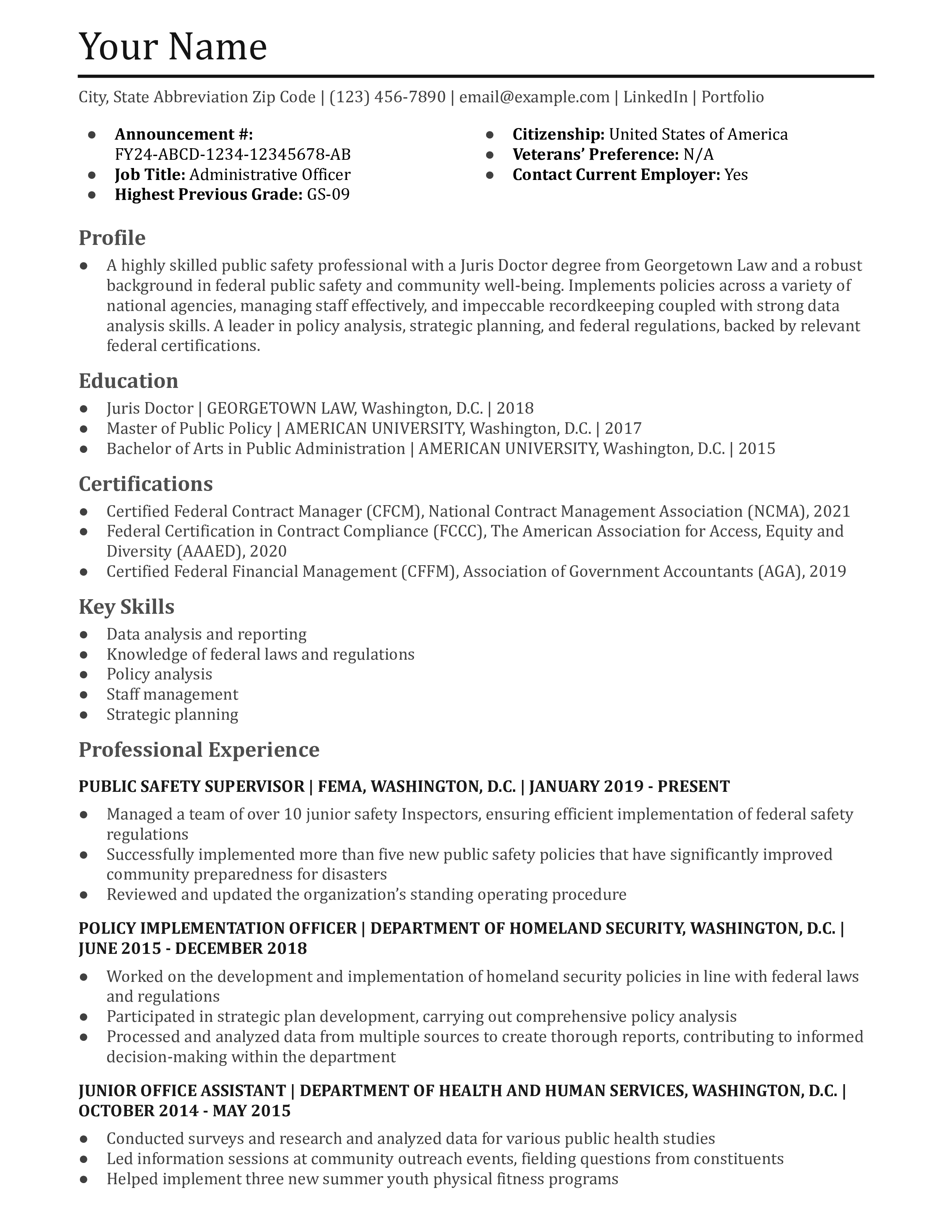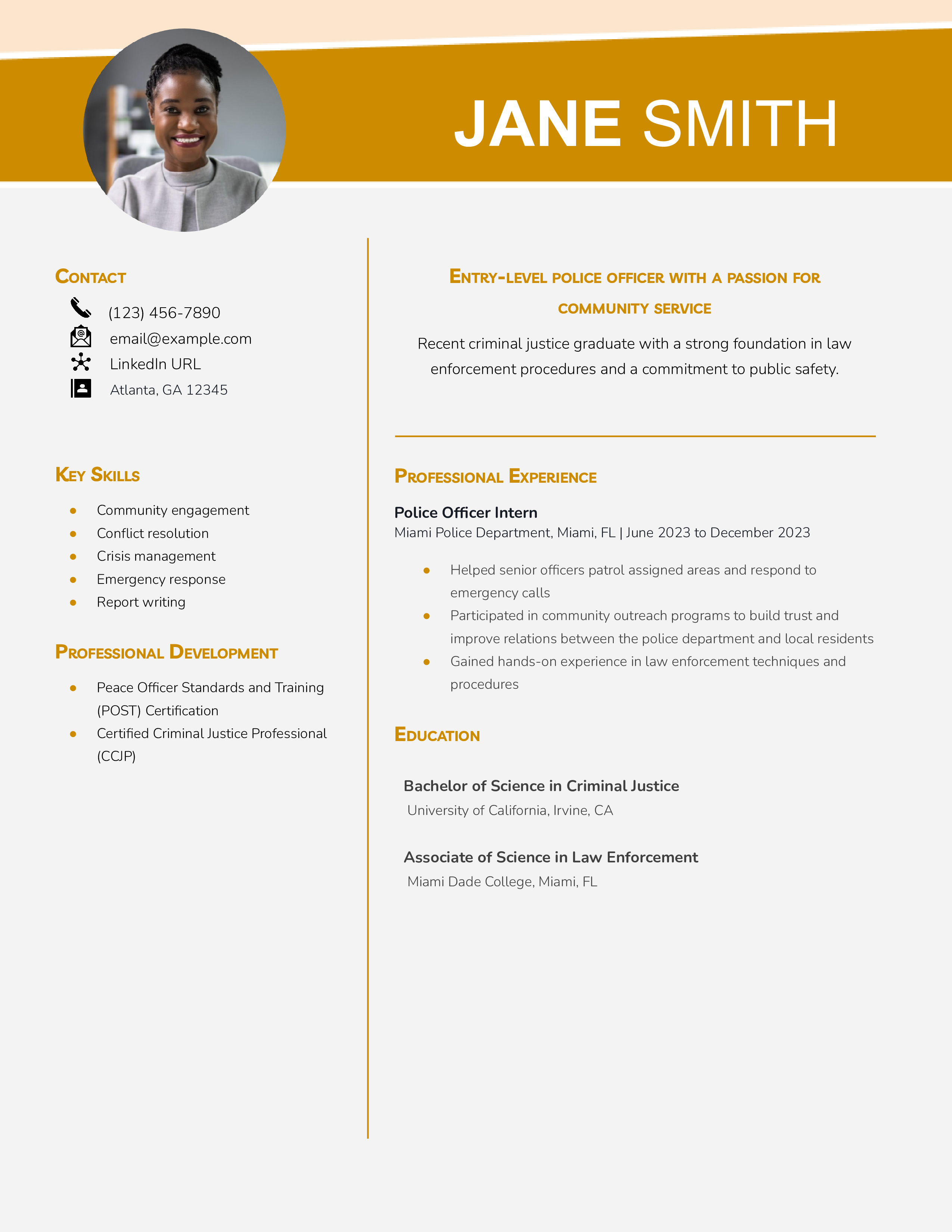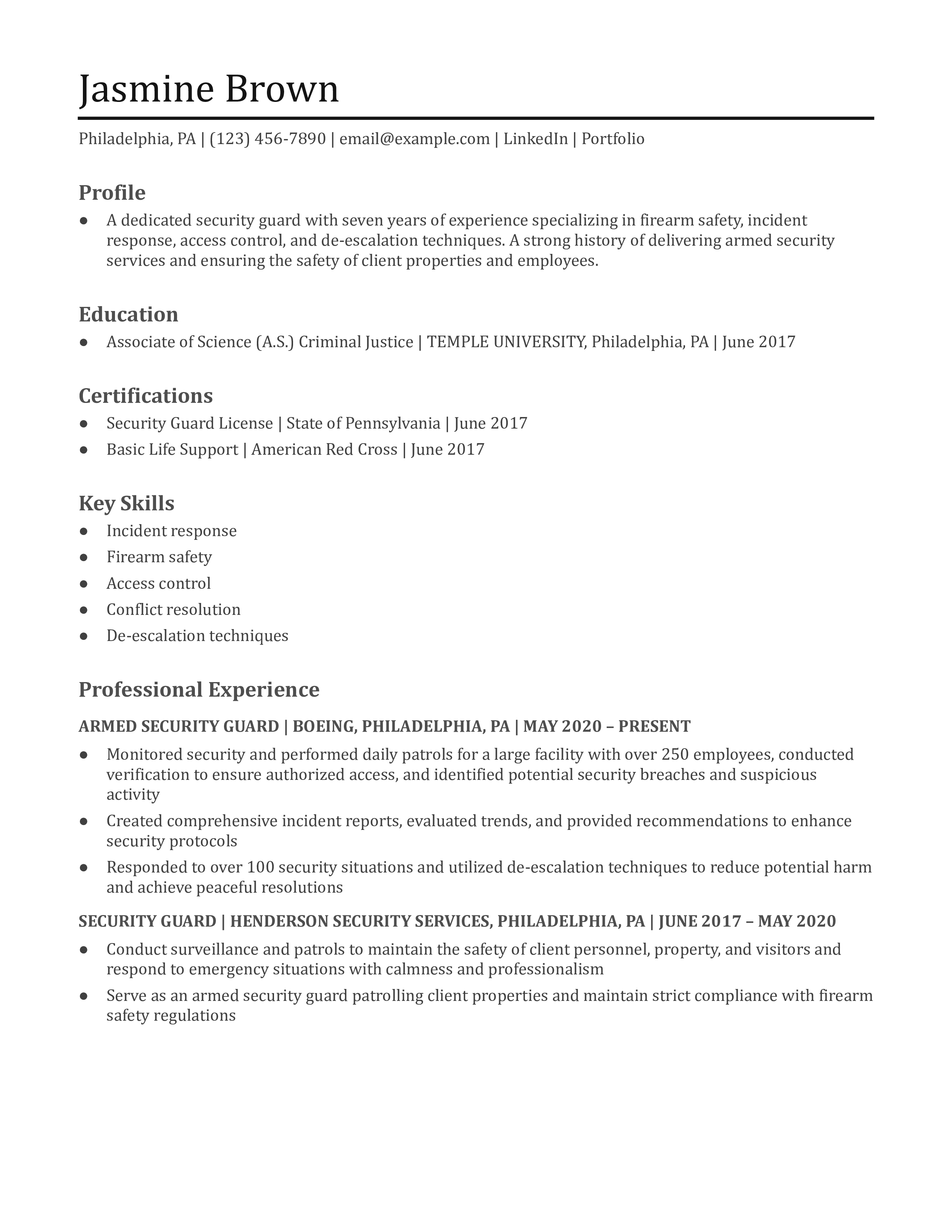- Correctional Officer Resume Templates and Examples (Download in App)
- How To Write a Correctional Officer Resume
- How To Pick the Best Correctional Officer Resume Template
- Correctional Officer Text-Only Resume Templates and Examples
- Frequently Asked Questions: Correctional Officer Resume Examples and Advice
- Check Out Related Examples
Correctional Officer Resume Templates and Examples (Download in App)
- Correctional Officer
- Correctional Officer Sergeant
- Entry-level Correctional Officer
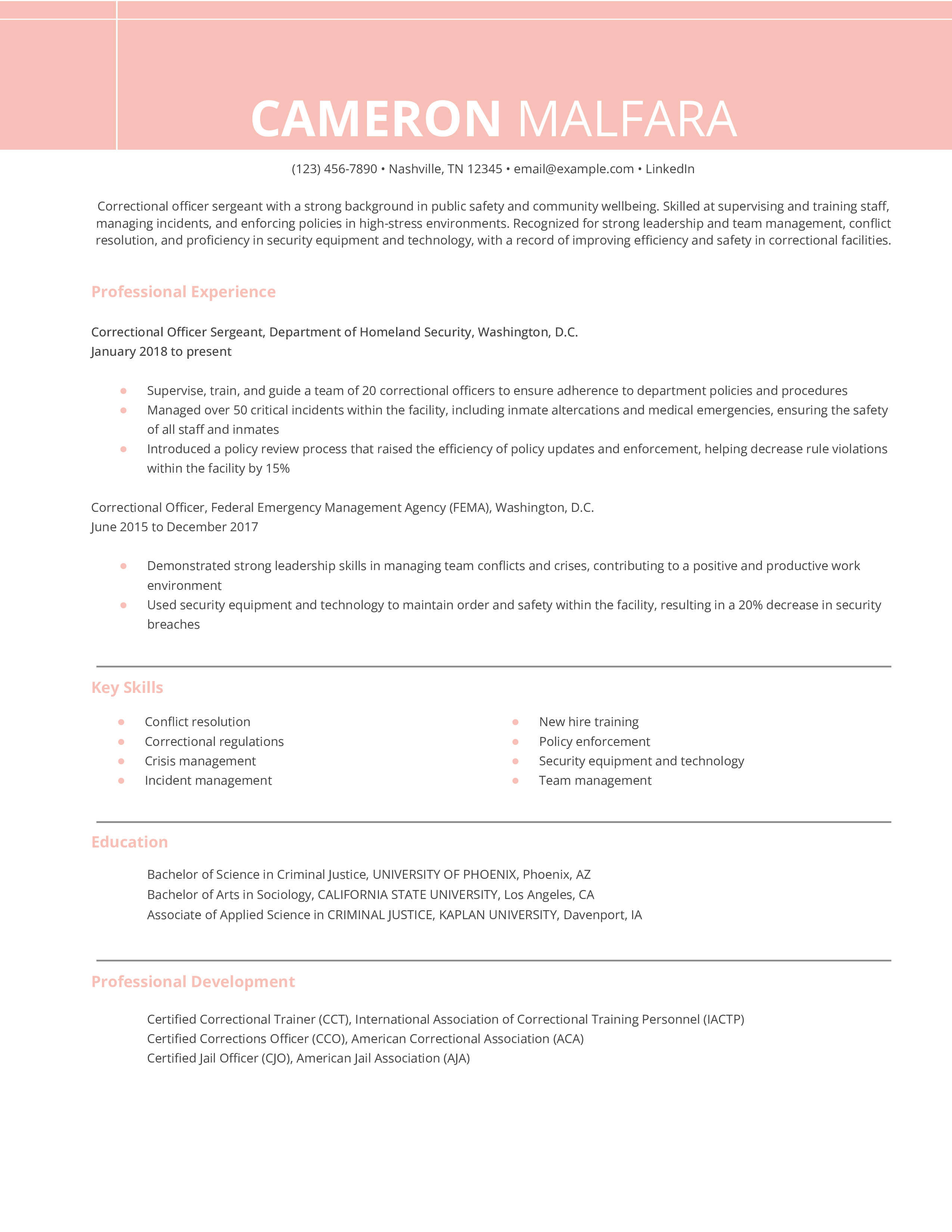
Federal Correctional Officer Resume Example
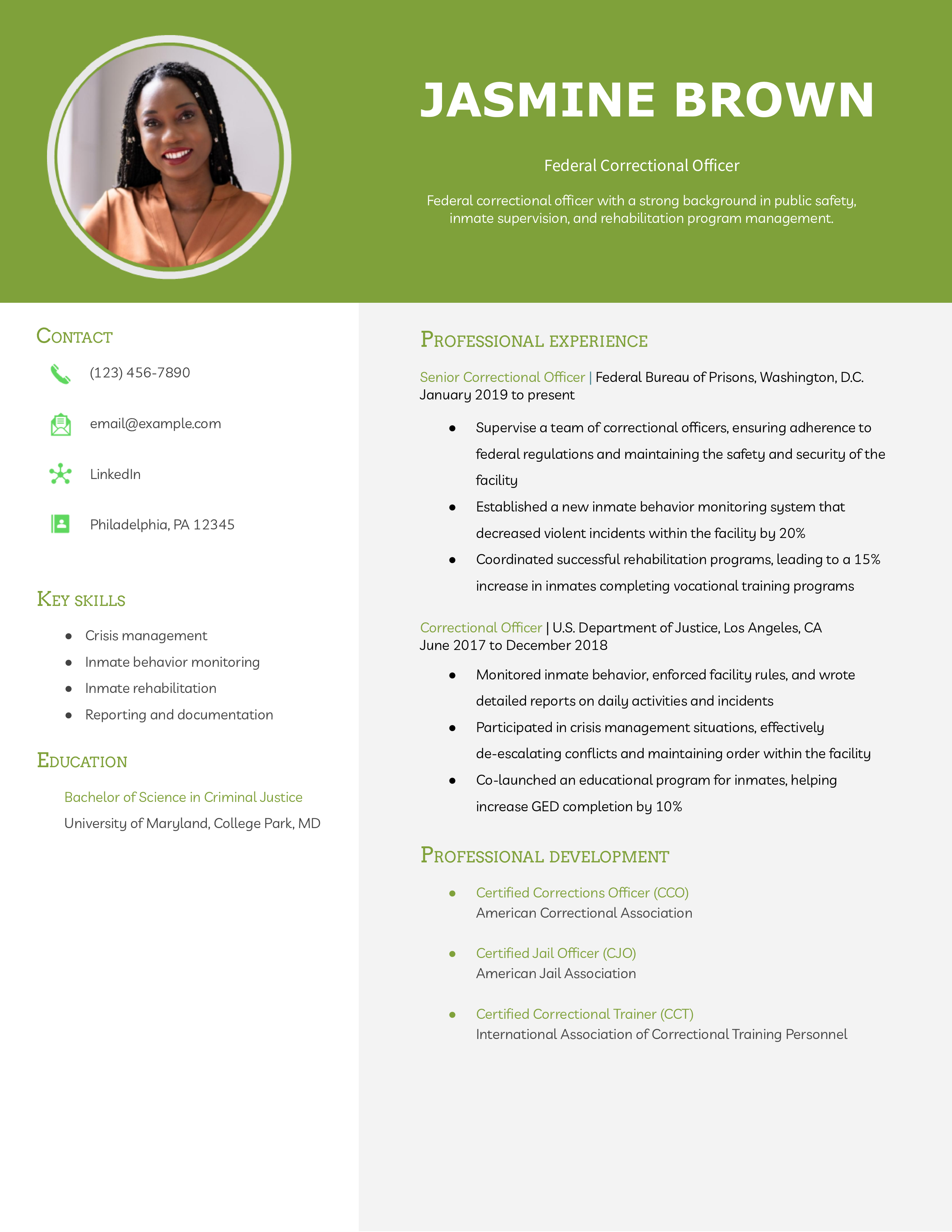
A good correctional officer resume focuses on your relevant skills like conflict resolution, inmate supervision, or report writing. Describe your past work and success as a correctional officer or in similar roles, and show your knowledge base by citing any training or certificate programs you’ve done. This guide provides expert tips to help you create a resume showing your best correctional officer qualifications.
Key takeaways:
- Brainstorm details about your work history on a separate document or sheet of paper. Then, identify the most relevant ones to feature in your experience section — this helps you focus your resume so it positions you for the role of correctional officer.
- Use bullet points to display your work highlights. Start each bullet point with a strong verb like “Created,” “Resolved,” or “Enhanced.”
- Spell out the results and value of your past work as a correctional officer. Describe how your efforts helped maintain an orderly and secure facility.
How To Write a Correctional Officer Resume
Using a template can help you write an effective correctional officer resume. Your correctional officer resume should usually include these sections:
- Contact information
- Profile
- Key skills
- Professional experience
- Education and certifications
1. Share your contact information
Give your full name, phone number, email address, location, and links to any online professional profiles. Ensure your current contact information so employers can reach you for an interview.
Example
Your Name
(123) 456-7890 | [email protected] | City, State Abbreviation Zip Code | LinkedIn
2. Write a dynamic profile summarizing your qualifications
Impress hiring managers at the top of your resume by giving the three to five primary reasons you can excel as their next correctional officer. These key points may include your:
- Years of related work experience
- Main strengths or specialties
- Work style or approach
- College degree(s) or certifications in your field
Example
Correctional officer with a strong background in public safety, crisis management, and inmate supervision. Hold a Bachelor’s degree in criminal justice and sociology, with skills in report writing, conflict resolution, and implementing effective behavior monitoring systems. Recognized for quick response and effective management during emergencies, ensuring the safety of inmates and staff.
3. Add a compelling section featuring your correctional officer experience
View the experience section as a chance to give examples of your work and success in roles similar to the one you’re pursuing. For each job in your recent work history, brainstorm your duties and achievements on a separate document or sheet of paper. Then, choose the most relevant details to feature as bullet points in this section.
Example
Correctional Officer Sergeant, Department of Homeland Security, Washington, D.C. | January 2018 to present
- Supervise, train, and guide a team of 20 correctional officers to ensure adherence to departmental policies and procedures
- Managed over 50 critical incidents within the facility, including inmate altercations and medical emergencies, ensuring the safety of all staff and inmates
- Introduced a policy review process that raised the efficiency of policy updates and enforcement, helping decrease rule violations within the facility by 15%
Resume writer's tip: Quantify your experience
Use relevant performance data and metrics to show the results you’ve achieved as a correctional officer when possible. Complex numbers put your work in context and give recruiters a better sense of your scope and impact.
Do
- “Monitored daily inmate activities for compliance with schedule and facility rules, reducing infractions by 15%”
Don’t
- “Monitored daily inmate activities for compliance with schedule and facility rules, reducing infractions ”
Resume writer's tip: Tailor your resume to each application
For each correctional officer job posting you respond to, note any details given about the hiring facility or organization. How do these details compare to your own recent experience? You can make a stronger first impression on the hiring manager by citing these similarities in your profile.
What if you don't have experience as a correctional officer?
Writing a resume can be challenging if you don’t have real-world experience. But remember, you still have valuable skills and knowledge from your education and training academy. Include any relevant coursework you’ve done or certifications you’ve earned. Also, describe volunteer work or internships you’ve completed in your field and emphasize your work ethic and willingness to learn. By focusing on these qualities, you can show how you’d be an asset to any team.
4. Include education and certifications relevant to a correctional officer
With the education and certifications sections, you can show you have a solid knowledge base in your field. Cite any credentials you’ve earned that speak to your abilities as a correctional officer. The following templates help you organize this information in your resume (note that years are optional).
Education
Template:
[Degree Name], [School Name], [City, State Abbreviation] | [Graduation Year]
[Relevant coursework or honors]
Example:
Bachelor of Science in Criminal Justice, University of Phoenix, Phoenix, AZ | May 2015
Certifications
Template:
[Certification Name], [Awarding Organization] | [Completion Year]
Example:
Certified Corrections Officer (CCO), American Correctional Association (ACA)
5. List correctional officer-related skills and proficiencies
A separate skills section lets you quickly display how to serve an organization. Below, you’ll find some key terms and skills to consider for this section:
| Key Skills and Proficiencies | |
|---|---|
| Conflict resolution | Correctional procedures |
| Correctional regulations | Crisis intervention |
| Incident management | Incident reporting |
| Inmate rehabilitation support | Inmate supervision |
| Policy enforcement | Report writing |
| Security equipment and technology | Staff training |
| Team management | |
Resume writer's tip: Use common action verbs
One of the best ways to enhance your resume is by starting each bullet point with a strong action verb. Dynamic verbs help you keep the hiring manager’s attention and show the varied nature of your experience. The following list can help you find a good mix of action verbs for your correctional officer resume:
| Action Verbs | |
|---|---|
| Created | Decreased |
| Enhanced | Fostered |
| Generated | Grew |
| Guarded | Improved |
| Increased | Introduced |
| Lowered | Monitored |
| Prevented | Ranked |
| Reduced | Reinforced |
| Reported | Secured |
| Streamlined | Strengthened |
| Updated | Verified |
| Won | |
How To Pick the Best Correctional Officer Resume Template
A resume is a simple tool for professional communication and should be formatted accordingly. Choose a clear and straightforward template, and avoid any template with elaborate graphics or various colors and font styles. Simple resume design helps a hiring manager scan for relevant information. It also enables you to tailor the document to each job application and update your work history.
Correctional Officer Text-Only Resume Templates and Examples
Anthony Gentile
Minneapolis, MN 12345 | (123) 456-7890 | [email protected] | LinkedIn
Correctional officer with a strong background in public safety, crisis management, and inmate supervision. I hold a bachelor’s degree in criminal justice and sociology, with skills in report writing, conflict resolution, and implementing behavior monitoring systems. Recognized for quick response and effective management during emergencies, ensuring the safety of inmates and staff.
Key Skills
- Conflict resolution
- Correctional procedures
- Crisis intervention and management
- Inmate supervision
- Report writing
Education
Bachelor of Science in Criminal Justice, University of Phoenix, Phoenix, AZ
Bachelor of Arts in Sociology, California State University, Los Angeles, CA
Associate of Science in Criminal Justice, Kaplan University, Davenport, IA
Professional Experience
Senior Correctional Officer, Federal Bureau of Prisons, Washington, D.C. | January 2018 to present
- Supervise a team of correctional officers, ensuring adherence to all facility rules and regulations, and maintaining a high level of safety and security
- Established new inmate behavior monitoring system that decreased rule violations by 20%
- Led crisis intervention during multiple emergencies, effectively deescalating conflicts and preventing injuries
Correctional Officer, California Department of Corrections and Rehabilitation, Sacramento, CA | June 2015 to December 2017
- Monitored and supervised the daily activities of inmates, enforcing facility rules and regulations
- Authored detailed reports on inmate behavior and incidents, contributing to disciplinary hearings and legal proceedings
- Commended for quick response and effective management during a medical emergency, ensuring the safety of inmates and staff
Professional Development
- Certified Corrections Professional (CCP), American Correctional Association
- Certified Jail Officer (CJO), American Jail Association
- Certified Correctional Trainer (CCT), International Association of Correctional Training Personnel
Why this correctional officer resume example is strong:
This resume uses dynamic verbs like “led” and “authored” to express how the applicant has been an active contributor at each organization.
Frequently Asked Questions: Correctional Officer Resume Examples and Advice
First, look closely at the job post text and note any repeated or emphasized words. Compare these phrases to the language you're using in your resume, particularly the profile and key skills sections. Then, seek ways to align your resume text with the job posting while not copying phrases or misstating your background.
For example, if the organization seeks someone collaborative, call out that aspect of your experience in your profile. Or say the company has many non-English speaking customers. Highlight your foreign language skills in your profile and as a separate section farther down the document. With adjustments like these, you can make your resume more relevant to each opportunity.
Most correctional officers should use the combination (or hybrid) format. True to its name, this format combines two essential features of other resume formats: the chronological format's experience section and the functional format's profile section. (The resume examples on this page all use combination format.)
A combination resume offers the best of both worlds by fusing these features. The experience section lets you outline your recent work history – essential information for most employers. At the same time, the profile section enables you to display your career highlights at the top, regardless of whether they're from that work history or another part of your background.
As a result, you can present yourself clearly and strategically. This format gives hiring managers the best view of your experience and relevant strengths so they can decide whether to call you for an interview.
Include a cover letter with your resume
A good cover letter can enhance your job application. To write a standout letter, get specific. Tell the hiring manager why you’re interested in their organization and the specific correctional officer role they hope to fill.
Check Out Related Examples
Resume Templates offers free, HR approved resume templates to help you create a professional resume in minutes. Choose from several template options and even pre-populate a resume from your profile.

